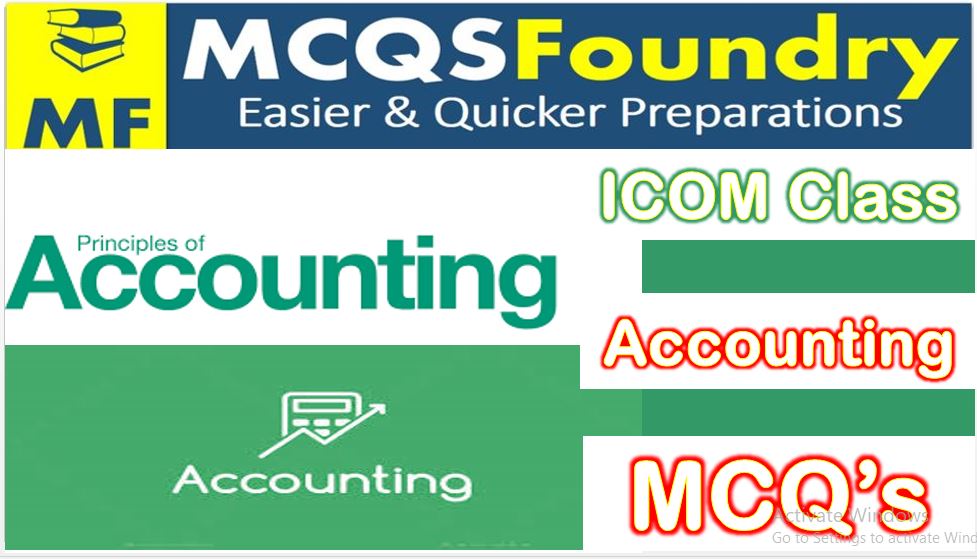MCQsFoundry.com brings to you 500+ Financial Accounting ICOM Mcqs which are new and latest. These Mcqs are never published on internet so far. For full information about all PPSC / FPSC / CSS / PMS latest jobs visit theiteducation.com

Chapter – 6
Accounting for Bill of Exchange
Encircle the most appropriate answer from the following four answers
1. A bill of exchange is a method of payment on:
- Cash basis
- Credit basis
- Accommodation basis
- Reserve basis
2. A bill of exchange is defined under Bills of exchange Act:
- 1982
- 1882
- 1906
- 1932
3. A bill of exchange is an:
- Unconditional order
- A Request
- A Promise
- Conditional order
4. A person who writes out the order to pay is called:
- Acceptor
- Drawee
- Payee
- Drawer
5.A person who is ordered to pay is called:
- Drawer
- Endorsee
- Drawee
- Creditor
6.When a drawer discounts the bill, he gets:
- More than face value
- None of these
- Less than face value
- Equal to face value
7.It is a period of time after which a bill becomes payable:
- Grace days
- Tenor
- Maturity
- Usance
8. The bills become payable at any time when they are presented by the holder are called:
Accommodation bills
Trade bills
Term bills
Demand bills
9.In case of term bill extra three days are given to acceptor are called:
- Days of grace
- Days of Bill receivable
- Day of tenor
- Days of bill of exchange
10. A bill of exchange is drawn by:
- Creditor
- Endorsee
- Debtor
- Endorser
11. If drawer is in need of money and cannot wait tilI due date and receive the money from bank it will be:
- Retirement of bill
- Discounting of bill
- Endorsement of bill.
- Dishonor of bill.
12. When a drawer transfers a bill to his creditor for settlement of his own debts is called:
- Retirement of bill
- Endorsement of bill
- Discounting of bill
- Settlement of bill
13.when a drawee honours his acceptance he will be credited:
- Capital account
- Bill payable account
- Drawer account
- Cash account
14. How many parties are involved in case of discounting of bill:
- Two
- Four
- Three
- None of these
15. When a drawer discounts a bill, he debits:
- Bank account
- Drawee account
- Interest account
- Bill receivable account
16.The person to whom the bill is transferred will become:
- Endorser
- Debtor
- Creditor
- Endorsee
17.When a bill is endorsed, then the endorser has:
- Current liability
- Contingent Liability
- Fixed liability
- None of those
18. A bill from the point of view of a debtor is called:
- Bill acceptable
- Bill payable
- Bill receivable
- None of these
19.Tn case of endorsement of bill the endorser debits:
- Bill payable account
- Creditor account
- Cash account
- Bill receivable account
20.Bank for collection account” is a:
- Permanent account
- Current account
- Fixed account
- Temporary account
21.When an acceptor refuses to pay the amount of bill to the holder of bill on its maturity is called:
- Honored bill
- Dishonored bill
- Retired bill
- Endorsed bill
22.When a bill is dishonored, the holder of the bill goes to an official called:
- Drawer
- Notary public
- Manager
- Inspector
23.When noting charges are paid at the time of dishonor of the bill, the drawee always debits:
- Noting charges account
- Discount account
- Drawer’s account.
- Interest account
24.In case of dishonor of bill, noting charges for dishonored bill are always paid by:
- Notary Public
- Drawer of bill
- Acceptor of bill
- Holder of bill.
25.When the bill is dishonored acceptor’s account is debited in the books of the:
- Endorsee
- Bank
- Drawer
- Drawee
26.Interest on renewal of a bill is an expense to the:
- Drawer
- Acceptor
- Endorser
- Endorsee
27. interest on renewal of a bill is an income to the:
- Drawee
- Debtor
- Drawer
- Acceptor
28.When a drawee is declared insolvent, which account is to be debited in the books of drawer:
- Deficiency account
- Bad debts account
- None of these
- Solvency account
29.In case of retirement of bill, the rebate or discount is a revenue for the:
- Holder
- Drawer
- Payee
- Acceptor\
30.Accommodation bills are drawn, accepted and endorsed:
- For quarter consideration
- Without any consideration
- For some consideration
- None of these
31.Retiring a bill under rebate means:
- Payment of bill before due date
- Making payment for the bill after due date:
- Dishonored bill.
- Discounting bill
32.Bill payable account is a:
- Nominal account
- Real account
- Personal account
- None of these
33.A trader whose assets exceed from his liabilities is called:
- Debtor
- Creditor
- Solvent
- Insolvent